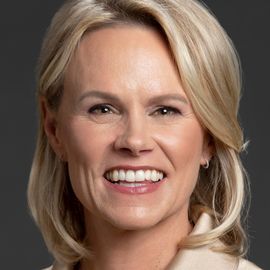The Drive to Get Better

Molly Fletcher has drive. She has passion and the desire to become her best self. This motivates her to set high goals for herself and to push through obstacles to achieve her next personal best.
Who is Molly Fletcher? A former college tennis player. A young woman who didn’t look for jobs during her senior year. A daughter with little money who drove out of her family’s driveway in Michigan and headed to Atlanta to make her living in the sports world. A wife and mother. A female sports agent who has represented top professional athletes.
Molly tells of sleeping on the couch at a friend’s apartment while figuring out how to quickly start earning some money. During her first days in Atlanta, she took some very strategic actions. She offered to be a tennis pro at apartment buildings with tennis courts. She learned which apartment buildings already had tennis pros. She reached out to a well-connected tennis industry professional she knew. He shared that he knew an apartment building tennis pro who was changing jobs soon but hadn’t given his notice. After negotiating for ongoing free promotional pizzas with the pizzeria across the road from the soon-to-be vacant tennis pro job, Molly returned to that apartment building to let the superintendent know that IF their tennis pro resigned, she would provide pizza at her weekly tennis clinics. Molly also provided an example of the tennis tips she could contribute to the monthly tenant newsletter. A few minutes later, Molly was the tennis pro at that building. The superintendent couldn’t believe her luck in finding a tennis pro just a few hours after their long-time pro had submitted his resignation. And Molly had just negotiated a free apartment in return for giving tennis lessons one evening a week. And Molly’s story goes on because she has drive.
Molly defines drive as the determination to get even better. Many athletes get to the pros because of there talent. Many achieve great thing but once they reach their goal they stagnate. Those who stay at the top of their game have a desire to continually get even better.
Those with drive are internally driven. They compete against themselves, not against others. It is continual growth, not their ranking among their peers, that motivates them. They love the pursuit of continual improvement.
Molly has interviewed many high performing athletes to discover what makes them be so successful and found that the best of the best have internal drive, want to get better, don’t pay much attention to the competition, and help the up and comers.
How many of these attributes do you have? Which ones would you like to develop further? What will you do this week to strengthen your drive to be the best you that you can be? You might be inspired by Molly’s Ted Talk, Secrets of a Champion Mindset.


